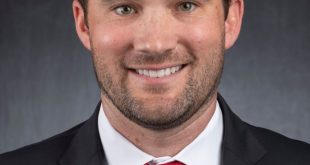No more classes on Friday?
This became one of the main topics of discussion at last Thursday’s Faculty Senate meeting at 3:30 p.m. in the UC Magnolia Room when Dr. Aubrey Fowler, assistant professor of marketing, proposed that VSU adopt a two-day class schedule.
This would mean that classes on Fridays would cease to exist, and would only be offered Monday to Thursday.
A mixture of thoughts overflowed as some felt that the proposed schedule should not be made mandatory, while others felt as if more research should be done before they make their decision to support or oppose this schedule.
In email interviews, a few of the faculty senators expressed their concerns on this topic and other points of business.
“I think we need to let good teaching and department and college needs drive the scheduling decisions rather than convenience, and NOT require 2-day-a-week classes if 3-day-a-week classes work better for [certain university] units,” Dr. Maren Clegg Hyer, assistant professor of English, said.
According to Dr. Hyer, core classes and classes in which reading and writing are extremely intense deserve to have more face-to-face time than what a 2-day schedule could offer.
While Dr. Jason Allard, associate professor of geography, is one of those senators waiting for more information. He feels as if changing the schedule should have minimal impact on students.
“I believe the students should still have access to the same number of course offerings as [they do] now, and be able to take these courses so that they can graduate in a timely manner,” Dr. Allard said. “If there would be an adverse impact on the students, I would not support a 2-day schedule.”
There are various things to consider when changing the way that classes are scheduled. For Dr. Allard, facility availability is one of them.
For Dr. Peggy Moch, professor of mathematics education, factors that impact students, faculty, curriculum, teaching, departmental scheduling and much more should be investigated.
Whether they support or feel indifferent, the senators can agree on one idea: that all sides of an argument should be heard before a final decision is made.
“All parties involved must be able to provide input into the decision, including the Student Government Association, the Council on Staff Affairs, faculty, administration, organizations or other interested groups,” Dr. Allard said. “Departments or groups that engage schools or organizations in the community should also be able to provide their input.”
Dr. Moch also agreed that the matter required some heavy consideration.
“I believe that such an implementation will require thoughtful consideration […] and cannot be just tried out without a lot of careful deliberation,” she said.
Senators finally came to a conclusion that a Special Committee, led by Dr. Fowler, should be formed to look into this proposal.
Also on the Faculty Senate’s agenda, was the issue of extending the grading deadline after finals week so that professors can attend graduation among other activities.
Dr. Hyer is in favor of this extension and suggests that the Academic Scheduling and Procedures Committee speak to the Registrar about this idea.
“I believe the grading deadlines are early so that staff members at the Registrar’s office have a large enough window to finish processing grades before semester break (perhaps affecting Spring registration and other factors),” she said.
One solution that Dr. Hyer has come up with is to give faculty a few more days to get grades in in, thus giving staff members at the Registrar’s office a little more time to process them.
“That strikes me as a good compromise that will greatly reduce faculty stress and enable faculty to represent the university at graduation exercises, while still allowing staff to process grades before the winter breaks come,” she said.
Dr. Moch thinks that the deadline should be prolonged to the Wednesday or Thursday after finals.
“Even the following Friday would be nice, to give professors a chance to carefully grade, reflect and decompress,” she said. “Not that we do not currently reflect and grade carefully, we do, but we sacrifice attending graduation and other activities to accomplish this task.”
Reforming the smoking policy was also on the agenda, but didn’t get addressed due to the absence of SGA senator Reginald Merritt, Jr., who was scheduled to speak on this subject. Other members of the SGA were present, but weren’t prepared to speak about it.
The Senate premiered their new addition to the meetings, a question and answer session with VSU President Dr. William McKinney, who couldn’t be present due to scheduling conflicts. Instead, he called in via Skype and responded to anonymous questions that some of the faculty sent in.
The only question that Dr. McKinney was able to answer was concerning faculty salary increases due to lack of time.
Other questions that were submitted involved traveling, the abuse of teaching loads and the faculty’s lack of knowledge about Jasmine Benjamin’s death. Dr. Karla Hull, acting as vice president for academic affairs, gave quick and brief responses to these questions on Dr. McKinney’s behalf.
 The Spectator The independent student newspaper of Valdosta State University
The Spectator The independent student newspaper of Valdosta State University





